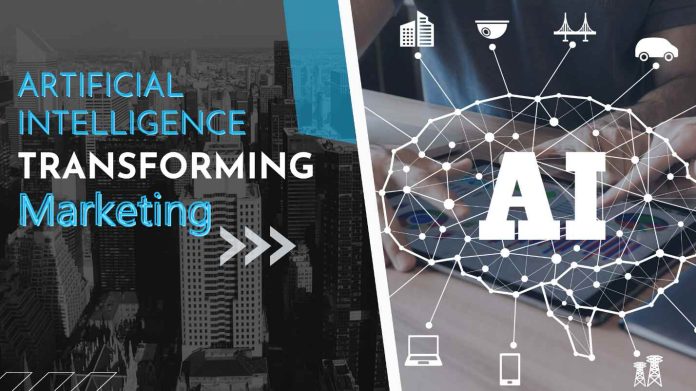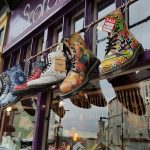Last Updated on January 1, 2023 by tabraiz579
Marketers look for new and improved ways to take marketing to the next level, and AI has been the newest edition in doing so.
What is AI Marketing?
AI marketing is a way to leverage customer data and AI to anticipate and know customer preferences and improve the customer journey. AI and ML advancements offer businesses better ways of doing so. Businesses leverage AI to devise effective marketing strategies, convert prospects, and improve the customer journey. As per Salesforce, 84% of market leaders used AI in 2020, which shows that companies are open to embracing artificial intelligence business solutions to improve their business processes.
Organizations have grown more sophisticated in adopting AI; they have started to look beyond basic solutions such as targeted advertising tools by Google and Facebook. Smart algorithms have become a necessity in today’s competitive environment.
Intelligent Advertising Design
AI allows for personalized design, which means marketing campaigns and other elements of the advertising material can be automatically tailored as per a specific audience. Algorithms help in designing color schemes that have more likelihood of grabbing the attention of the target audience, which increases the chances of engagement. For instance, you can know the age and gender of your target audience, and you can plan more visual content for the younger audience and text-based content for the older audience.
Image Recognition
With computer vision, marketers can scan the vast number of images that are uploaded on social media and understand where products and services are used. It allows marketers to assess factors like brand awareness and market penetration. Another powerful way to enhance brand awareness is trend analysis; AI picks out the changing preferences of customers and potential customers and how they influence customer engagement.
SEO Research
Ranking top on search engine results is an crucial part of most marketing strategies. Search Engine Optimization (SEO) is regarded as the driver of marketing success; as per research, Google is the first stop when it comes to making buying decisions. Some of the most sought-after SEO daily leverage ml algorithms to know the intent behind keyword usage and content searches.
Intelligent Website Audits
To understand where you are lacking, it’s important to track the flow of visitors to your social media channels and website. AI-driven services automatically review your site, and you can get hold of potential issues, like slow-loading pages, and unoptimized images, and fix them at the earliest. Traditional methods of carrying out audits take time and often require a third-party consultant. Automated AI tools make the process easier and quick.
Let’s see the top 10 cases and Examples of AI in Marketing
1. Starbucks: Personalized Suggestions with Predictive Analysis
As per research by Aberdeen, businesses that use predictive analysis to identify customer needs can increase their organic revenue by 21% compared to 12% in the absence of predictive analysis. Starbucks uses app and loyalty card to collect and analyze customer data. The app provides a great customer experience by recording details of the purchase, including the time of the day. The company uses predictive analysis to process the data and send personalized marketing messages to customers.
2. Unilever: Makes use of AI Data Centers
Unilever uses AI data centers around the world to get insights from different sources, including social listening, traditional marketing research, and CRM. With the help of technology, Unilever had a breakthrough when it discovered the link between breakfast and ice cream. There are at least 50 songs that talk about ice cream for breakfast. Unilever came with a range of cereal-flavored ice creams for the Ben & Jerry’s brand.
3. Alibaba: Fashion AI Store
Alibaba, the retail giant, opened a physical store in Hong Kong. The FashionAI store has intelligent garment tags that have smart mirrors which show clothing information when the garment is touched. Alibaba’s store is a perfect example of going hand in hand with changing user preferences. The National Retail Federation survey pointed out that 80% of shoppers thought that advancements in retail technology have enhanced their buying experience.
4. Chase: AI in Copywriting
Chase Bank finalized a five-year deal with Persado, a US-based company that makes use of AI to marketing creative. The major reason Chase signed the deal is that after testing solutions by Persado, Chase witnessed that machine learning in their copywriting provided them with more humanity in marketing. Chase is the first example to leverage machine learning on such a large scale for copywriting. The machine learning copywriting performed better and helped in increasing sales.
5. Amazon: Personalized Product Recommendations
Amazon is known for leveraging machine learning to offer personalized product recommendations. In 2019, the company announced general availability to Amazon Personalize. Since the initial rollout, the company has enhanced its functionality, and now it can deliver up to 50% better recommendations in various product types.
6. Sephora: Chatbots for Better Customer Experience
Chatbots are seeing a fast growth; they have become a popular communication channel for customers and have seen increased usage of 92% between 2019 and 2020. In 2017, the beauty brand Sephora began using a chatbot on Kik. It quizzed customers on their product preferences and helped them narrow down their choices. Sephora gained valuable insights, and since then, it has launched more chatbots on Messenger.
7. eBay: Derives Email Marketing Success with AI
eBay, the global eCommerce marketplace, always comes up with new ways to engage customers. eBay has been incorporating AI since 2016, focusing on enhancing its marketing copy, particularly email. Optimizing email marketing performance is simple for an average brand, but eBay has more than 187 million email subscribers across the world, and it’s not easy to come up with attractive and impactful subject lines to drive open rates. During this time, eBay turned to Phrasee, an artificial intelligence-powered customer experience platform; it uses natural language generation and deep learning to curate content. Thanks to Phrasee, eBay generates custom copy that resembles its brand tone along with specific promotions and customer needs. eBay has seen great improvements in its marketing campaign, including a 31% average click uplift and 700,000+ incremental clicks.
8. Tomorrow Sleep: 100X increase in Organic Traffic
Mattress startup Tomorrow Sleep leverages the benefits of AI in marketing. The company was launched in 2017, and 12 months later, it started content marketing. It didn’t have the budget to compete with big brands and beat them in the organic search market. So, it focused on intent-driven terms. Tomorrow Sleep turned to MarketMuse, an AI-powered writing and content research platform. The platform identifies related and primary topics and analyzes the top 20 search results to identify gaps and opportunities.
9. AMA: More Newsletter Engagement
Marketing AI helped American Marketing Association (AMA) achieve great results. Since marketing experts make up most of the audience of AMA, they always have to be on their toes to bring out the best and send high-quality communications. AMA wanted to personalize everything, but they covered diverse topics from content development to UX design, and it was not easy to do meaningful personalization for every newsletter subscriber. AMA teamed up with rasa, the artificial intelligence-driven personalization platform, and leveraged it to the fullest to generate individualized subject lines based on the interest of the recipient. After joining hands with rasa, the monthly subscriber engagement rate of AMA increased by 42%.
10. Magnolia Market: Bridging the Gap
Magnolia Market is a physical store owned by Joanna and Chip Gaines. The store is well known for its great customer experience. They create an amazing experience by combining games, food, shopping, and a garden. Since not everyone can visit the store. Magnolia, with the help of Shopify Plus, created a storefront and an app powered with augmented reality to view products in 3D. It provided the users with the highest photo realism possible. The results have provided Magnolia with the upper hand in the competition.
Wrapping Up
AI in marketing has evolved; it has provided businesses with an opportunity to engage their target audience. Artificial intelligence Benefits and services are utilized by many businesses to enhance customer experience. Gone are the days when businesses were afraid to utilize technology. Nowadays, businesses understand the importance of leveraging new-age solutions to increase their reach. When it comes to marketing, AI has greatly transformed many businesses. Chatbots and other on-point AI solutions have helped companies achieve remarkable growth in a short period. AI makes tasks easier and increases the efficiency of the employees. When it comes to marketing, AI has become an integral part of many diverse industries.
Author Bio:
Diksha Sharma, content writer at MoogleLabs an ai business solution company based in the Canada. Her passion for helping people in all aspects of online digital marketing through in expert industry. She works closely with B2C and B2B businesses providing content that social media attention and increase their search engine visibility.
Apart from this if you are interested to know more about Digital Marketing Agency then visit our Business category


























